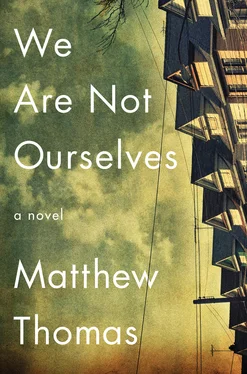Gloria took out a pack of cigarettes. “Care if I smoke?”
Eileen shook her head.
“I don’t normally smoke around clients. Believe me, it’s not easy not to.”
“Please feel free.”
“I feel comfortable around you,” Gloria said.
Eileen looked down. Gloria was a working girl, like her. Her shoes were slightly scuffed, and Eileen could tell she painted her nails herself. She wondered what her father would have thought of this performance of hers. Her lip began to tremble.
“When I said under a million, I think I wasn’t being entirely realistic.”
“What’s a better number?”
“You’re not going to like it,” Eileen said.
“I can work with any number. I just need to know where to start.”
“I don’t even know if I can convince my husband to move.”
“Look at you. You’re a beauty. He’ll go wherever you want.”
“You’re sweet,” she said. She could feel sadness gathering in her chest, as though scattered shards of it were being pulled from her extremities by a powerful magnet.
“What are we talking about? Eight hundred? Seven?”
Eileen felt anxious talking about money this explicitly; she felt as if the agent had held a bright light up to her face and could see the imperfections on her skin.
“More like four,” she said. “Five at the most.”
“Hoo-wee!” Gloria exhaled a deep puff and stabbed the butt out on the step. “Do you have any idea how much this house is listed at? Take a guess.”
“Eight hundred thousand.”
“Nine fifty ,” she said with a flourish, like she was calling out someone’s weight at a carnival. Gloria laughed. “We’re going to have to change our strategy.”
“I’m sorry I’ve wasted your time,” Eileen said miserably.
“Look, I’ll be straight with you. We’ve wasted some time. But I don’t really mind. I like looking at houses. I’ll find you a good one. One your husband won’t be able to resist.”
They agreed to go looking again the following week. As she returned Gloria’s hug good-bye, it occurred to her how grateful she was that this woman who weighed her fate in her hands hadn’t humiliated her.
• • •
She had an electrolysis appointment scheduled at her regular place in midtown. She didn’t feel like going, but it was impossible to get an appointment, and she had begun to obsess over the little hairs that poked through her top lip and dotted her jawline. She wondered if they were harbingers of greater changes to come. Lately her skin tingled and itched a little more than usual. She felt warm at odd times; she wasn’t ready to call them hot flashes. Her breasts seemed slightly less full. She’d always had irregular periods, so there wasn’t anything to read into those, but she did have more headaches lately, though it was hard to imagine anyone not having headaches under her circumstances. She wasn’t going to bury her head in the sand when the change began, but she also wasn’t ready to conclude that it had begun before she had firmer proof. In the meantime, she was going to fight to hold on to her beauty as long as she could.
To avoid the traffic snarl, she took the train. On the way back, the crowd on the 7 platform pressed close, and the train offered no relief. At every stop the car got more crowded instead of less, until at Seventy-Fourth Street the train bled riders making connections to other lines. The walk home from Eighty-Second Street thrust in her face the horrors of the change. The street had once been the jewel in the neighborhood’s crown. The white stucco storefronts were crisscrossed with wooden planks to give it a Tudor charm — Tudor was another style she recognized now when she saw it — and the streetlamps were made of ornate iron, but now gangs clotted its great arterial expanse, and the mom-and-pop stores had given way to bodegas, check-cashing places, and dollar stores with cheap signs that obscured the old facades. The globes that used to adorn Eighty-Second Street’s lamps were gone. Similar ones could still be found on Pondfield Road in Bronxville, which might have been part of why she was so drawn to the town: it was like a time capsule of Jackson Heights before the collapse.
As she made her way down the street, a group of young men in sweatshirts and baseball caps — they looked Hispanic to her, but she couldn’t always tell — were heading in her direction, taking up the width of the sidewalk. One of them walked backwards in front of the others, gesturing wildly with his arms outspread as the others clapped and hooted. A collision would ensue unless she went into the street, and she wasn’t about to do that; they should all be able to share the sidewalk. The one with his back to her wasn’t turning around. She decided to stop and hope they would filter around her, like water around a branch lodged between rocks. She held her hands in front of her protectively. The young man reacted too slowly to the wide-eyed looks of his friends and bumped into her.
“Excuse me!” she said, more shrilly than she’d intended. He spun around in a defensive posture, as though in preparation for a karate chop. When he saw her he dropped his hands.
“Sorry, lady,” he said. The others snickered. She knew she should just keep moving and not say anything. She had an instinctual fear of groups of young men like this. She’d heard stories of ugly incidents. Still, she felt a wave of righteous indignation pass over her.
“This sidewalk’s for everyone, you know.”
“Sorry,” the young man said. “It was an accident.”
She had wrung a second apology from him; she knew this was probably the time to stop. They could run off and have a laugh at the crazy white lady. Maybe they’d shout curses at her as they receded from view. The perfunctory way he’d apologized irked her, though. She was going to teach this young man how to comport himself, even if no one else was bothering to take the time to do so.
“You should watch where you’re going,” she said. “It’s hard enough to get down this sidewalk. There was no room to get past any of you.”
“Whatever you say.” There was a restrained quality to him, as though he were a tiger waiting to pounce.
“It’s my neighborhood too,” she said. “Just because you’re taking over doesn’t mean I’m leaving.”
One of the boys standing behind the one who had bumped her moved forward. She knew what was coming: Fuck you, white bitch! But the other put up his hand to restrain him. “Hold up,” he said. “I’m sorry for running into you. I didn’t mean to crowd the sidewalk. Nobody’s taking over your neighborhood. I was born here. There’s room for all of us.”
His articulateness shocked her. He parted the group to make room for her and indicated with a pacific gesture that she should pass. As she hastened to leave she replayed the incident in her mind, trying to make sense of the inscrutable turn it had taken. She had expected hate to be directed at her and had almost been disappointed not to face it. The kid had been raised well, there was no denying it. She wanted to forget the encounter. It unsettled her more than a brush with violence would have. A vision of the future loitered in it, an intimation of her obsolescence.
That night, when she told the story, she substituted for the young man’s oddly delicate apology a bowdlerized version of the slurs she’d anticipated hearing — which was, in any case, closer to the truth of her lived experience than this inexplicable aberration. “I wouldn’t repeat some of the vile things I heard,” she said, “even if Connell weren’t here.” It was a venial sin, she knew, but she didn’t have to labor to justify it to herself, because it was in everyone’s interest that they move to the suburbs. Ed, though, offered up only a muted version of the chivalric indignation she’d expected to hear, which stoked the fire of her anger at the gang members. Within a few days, she’d begun to consider the possibility that they’d actually said some of the things she’d put in their mouths, and there was a decent chance they had, memory being such a slippery thing.
Читать дальше
Конец ознакомительного отрывка
Купить книгу












